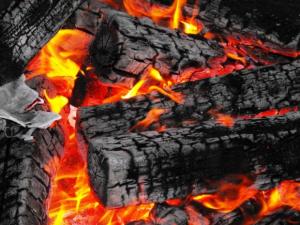Firewood in Nigerian Kitchens continues to play a central role in daily cooking. Many households, particularly in rural and semi-urban areas, still reply on it for preparing meals despite the increasing availability of alternative fuels.
Its smoky flames carry taste, memory, and tradition that neither gas nor charcoal can fully replace. For some families, it is also the more affordable choice, tied to habit and cultural identity.
Zainab, a 31-year-old resident of Daura, has never known another way of cooking. “I have never cooked with gas before. All my life, I have been using firewood because I grew up with it.
I use charcoal sometimes, but firewood is easier for me. Firewood is what I know.”
For Mariam, a 39-year-old housewife, firewood is tied to her husband’s nostalgia. “My husband always says the fried eggs his mother made tasted better on firewood.
Firewood in Nigerian Kitchens
So I fry eggs on firewood, just to remind him of his childhood.”
Hajara, a 26-year-old food vendor, said firewood gives food a flavor no other fuel can provide. “When I cook jollof rice for parties, I always use firewood. It brings out a special flavor.
Gas and charcoal cannot give you that same smoky taste. My customers expect it.”
But even warnings from doctors cannot keep some people away. Amina, a 37-year-old married woman, recalled: “There was a time I was sick, and the doctor told me to avoid smoky areas because of my eyes.
But how can I stop? Firewood is what I grew up with. It is not just about cooking. It is about sitting together as a family sharing stories, and working around the fire. That memory cannot be replaced.”
while firewood carries memory and tradition, but for others, it remains the more affordable choice. And for many, it is simply the way they were raised.
Firewood in Nigerian Kitchens
Cost is another factor. Mallam Usman, a 42-year-old man, explained: “I use both charcoal and firewood. The least charcoal I can buy is ₦200, while firewood is more expensive, up to ₦500.
But I prefer firewood. My wife is already used to it. Sometimes I buy charcoal to ease the work, but mostly we use firewood because that is what we have always been using.”
Abdulmumin, a firewood seller in Rumfar Shehu who is over 40, said many people still depend on his trade. “People still come to buy firewood every day.
Even though the price is high, food vendors, households, and those catering for events still buy it. Firewood is something people cannot abandon. We have been using it since the time of our grandparents, and it still holds memories.”
Firewood in Nigerian Kitchens
But experts warn that firewood comes at a cost. According to a 2024 report from the National Bureau of Statistics published in Punch Newspaper, 67.8 percent of Nigerian households still cook with firewood. In Bauchi State, the figure is as high as 91 percent.
Doctors interviewed by Punch Healthwise have cautioned that prolonged exposure to smoke can lead to lung disease, eye problems, and respiratory infections. They noted that women and children, who spend long hours near smoky kitchens, are especially at risk.
One pulmonologist, Dr. Abiona Odeyemi of Osun State University Teaching Hospital, explained that smoke from firewood damages the lungs over time, leading to serious health conditions.
Experts have also raised concerns about the environmental impact. Firewood use contributes to deforestation, worsens climate change, and adds to indoor air pollution.
Firewood in Nigerian Kitchens
In rural areas, large trees are cut daily to meet demand, reducing forest cover and threatening biodiversity. Environmentalists say the continued reliance on wood-based fuel is not only unsustainable but also places pressure on future generations who may face shortages of both trees and clean air.
Firewood in Nigerian Kitchens
Government efforts to promote cleaner alternatives have faced mixed success. Liquefied Petroleum Gas (LPG) is being promoted as a safer option, but rising costs, supply shortages, and safety concerns make many households hesitant to adopt it.
For rural dwellers, the absence of reliable gas distribution networks means firewood remains the most accessible option. Some non-governmental organizations have introduced energy-efficient stoves that reduce smoke and save wood, but adoption is still slow due to cultural preference and limited awareness.
At the heart of the matter is the connection between firewood and identity. For many Nigerians, cooking on firewood is more than a survival strategy, it is a way of preserving heritage. Weddings, festivals, and large family gatherings still rely on firewood pots bubbling with tuwo, jollof rice, or miyan kuka. The sight and smell of smoke rising from a neighborhood canteen often signals not hardship, but community and celebration.

Still, the health risks are real, and the environmental damage continues to mount. Experts argue that awareness campaigns, subsidies for cleaner fuels, and community-based forest management could help balance tradition with modern realities. But until such policies take deeper root, firewood will remain a familiar sight in both rural compounds and urban backyards.
Firewood in Nigerian Kitchens
In the end, the flames continue to glow. For some, firewood carries memory and tradition. For others, it remains the more affordable choice. And for many, it is simply the way they were raised.
Gas may be quicker and charcoal less smoky, but in countless Nigerian homes, firewood still burns, not just as fuel, but as a link between the past and the present.